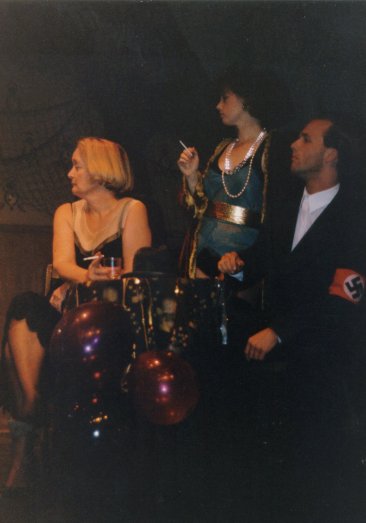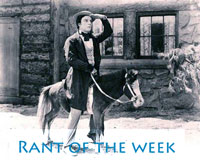Pantages Theatre, Toronto, April 23, 2001
"Cabaret", after all, is still a musical.
You know-- those dippy concoctions in which impossibly handsome
lumberjacks sing schmaltzy love songs to dainty girls with kerchiefs in their hair while
throwing them over hay stacks and pitch-forking in unison. Absurdities, in other
words. Something which, in the right context, could be mistaken for a parody of
something that is stupid it couldn't possible exist in an original form.
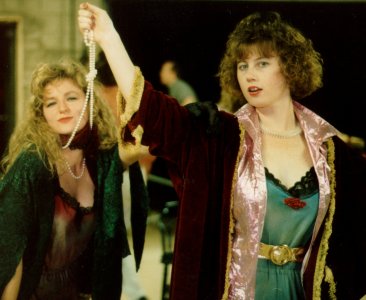
(Photos from 1992 Theatre Kent production of Cabaret, Chatham, On.)
Yes, you heard it here first: the musical is no more of an "art
form" than ceramics or collectible dolls or the can-can.
So Cabaret is still a musical, and so, at some point, Sally Bowles sings
a dippy love song about this man (Cliff) just maybe being the one who will turn
out to be "different" from all the other one-night stands, and might be that one
special person with whom she can build an enduring relationship
and it's obviously a showpiece number, and the audience is expected to applaud at the end
of the song even though it occurs in the middle of what is supposed to be a play, a
story, a narrative, and even though the guy is gay.
By the way-- I have to rant about this for a moment-- the
theatrical tradition of applauding at the end of a musical number within a theatrical
performance is absolutely disgusting, contemptible, idiotic, annoying, and stupid. I
hate it. If the drama is worth watching, the last thing in the world you want is
for the audience to suddenly break out into applause. The drama is supposed to
flow from scene to scene. Contrasts and ironies are developed and intensified.
Emotions are pitched. Characters are illuminated. But, suddenly:
hey, great singing there Alphonso! Bravo! What a show-stopper! Now,
what was the girl doing with the rope around her neck?
And so it was in Cabaret. The audience applauded after every song.
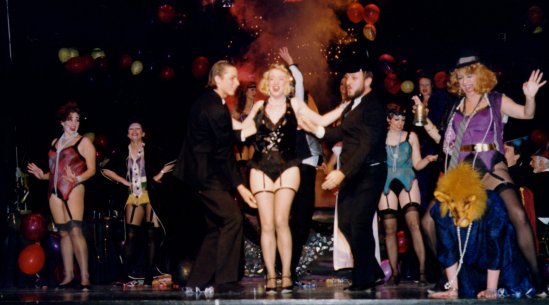
Now, in all fairness, most of the singing in Cabaret takes place in the
Kit-Kat club, so the applause is not as disruptive as it is for, say, "The Sound of
Music", wherein we all applaud the children going to their bedrooms, or a nun dancing
on what is supposed to be a hillside.
Now, for most musicals-- a phony art form if ever there
was one-- the applause at the end of each song is not really a problem because I never
hear it because I rarely go to musicals. Do I really want to see
"Oklahoma"? No. Do I think "The Sound of Music"
really illuminates the nature of the Nazi terror? Not a chance. Does
"Oliver" move me to some kind of state of contemplative bliss? Oh,
please...
For the record, I have seen some musicals, live, on-stage, as well as a
few on film. Here's a list that I can remember off-hand:
Oklahoma (so very weird)
The Producers (delicious and funny, because it mocks the musical)
The Sound of Music (compared to "Cabaret")
Fiddler on the Roof (least bad of this lot)
Cabaret (a twisted work of dark genius)
Hair (a musical with pseudo-rock songs in it.
The Milos Forman
movie version is interesting.)
Oliver (can't remember)
Showboat (boring, sorry.)
Camelot (awful)
West Side Story (Natalie Wood's vocals were recorded by Marni Nixon--
need I say anything more about phoniness?)
South Pacific (dumb, dumb, dumb)
My Fair Lady (who cares)
I have also seen and enjoyed "Jesus Christ Superstar" live and
on film, and "Evita" on film, but neither of these are really musicals.
They are operas. The word "opera" is death at the box office, so they are
advertised as "musicals". Get it straight: "Jesus Christ
Superstar" is an opera, in form and style and design. It has arias and
recitatives and
the entire narrative is contained in the songs. It is an OPERA. And so
is "Evita".
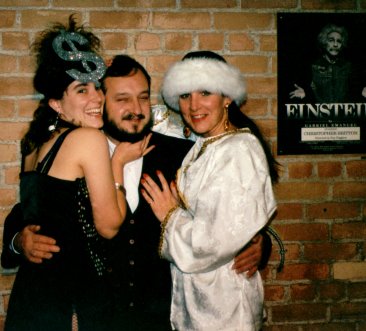
(Backstage)
Anyway, back to "Cabaret". "Cabaret" is
loosely based on a book by Christopher Isherwood that is a fictionalization of his life in
Berlin during the rise of the Nazis. It's really not a very good book. It's
interesting, and it's not awful, but it's not great literature. But he did create
some memorable characters and we don't really have very much good English writing on
Berlin in the 1920's or 30's so it stands out. In 1951, a guy named John Van
Druten thought so too and wrote a drama (not a musical) based on the stories and it was
produced on Broadway with Julie Harris and it was deemed a success. In the 1960's,
Hal Prince decided to develop it into a musical and recruited a couple of guys named John
Kander and Fred Ebb to create the songs. Joel Grey created an absolutely
unforgettable "Emcee", and in 1966 the Broadway production won 8 Tony awards
including "Best Musical". In 1972, Bob Fosse made it into an
exceptionally good film-- except for the awful casting of Peter York as
"Cliff" and Liza Minnelli as Sally Bowles-- which won numerous Oscars including "Best Director".
Joel Grey indispensably reprised his role as the Emcee.
The production I saw live at the Pantages was "directed" by
Sam Mendes, who directed the film "American Beauty". Did Sam Mendes
actually direct this version? I doubt it. More likely, this staging of Cabaret
was based on his original staging, but directed by Rob Marshall.
Now, odd things happen to brilliant talents in our culture. We live
in a democratic, free society. The powers that be do not censor our literature or
movies or theatre. That means, in theory, that you can say anything you want in a
play or movie or book, and no one will arrest you and prevent people from seeing or
reading what you have to say.
No. But we go one better: when someone presents a
disagreeable
message to us, a message that might imply that there are faults or sins or crimes in the
way we-- the collective "we", the audience-- act, we simply appropriate the
message, repackage it, and make it into a cultural artifact.
Consider, if you will, the title song of "Cabaret".
What good is sitting alone in your room?
Come hear the music play,
Life is a cabaret, old chum,
Come to the cabaret
A line from this song-- "What good is sitting alone in your
room"-- has been appropriated by SFX productions for the advertising of the touring
version of "Cabaret". Obviously it means, in this context, don't stay home
watching television or playing cards or staring discontentedly at your spouse! Get
up off your fat duff, whip out your credit card, and fork over $80 for a crummy seat at a
large theatre and watch our packaged presentation of a musical that collected amazing
critical reviews and therefore must be good. Get out! Have a great time!
Make it dinner and a show, and stay overnight at the Ramada with the pool and sauna
and calypso bar! Enjoy yourself! Live!
The trouble is, that's not what the song means at all. In the
context of the play, Sally is announcing her refusal to accept reality, or any kind of
responsibility for the monumental evil that is closing in around her. When Cliff
announces his disgust with the Nazis, Sally says, "but what has politics to do with
us?" Cliff tells her that she is blind. And the play tells us that this
diseased society-- Berlin of the 1930's-- has opened itself to the infusion of Nazi
ideals. And Sally blithely sings on, "life is a cabaret, old chum..."
Is this the sentiment the audience wishes to identify with?
I grant you-- the advertising itself might be playing with irony.
But I doubt it.
In the original production by Hal Prince, another line did cause
consternation. The Emcee does a little dance with a gorilla, while singing to the
audience that, if they could only see her through his eyes, they would realize how
beautiful and desirable she was. At the end of the song, he sings,
"if you could
see her through my eyes/
she wouldn't look Jewish at all".
It's a terrific line. It's a fabulous line. It's the entire
heart and soul of the play's anti-nazi sentiment. And it was rejected by the
original producers and deleted from the production! Why? Because they thought
it would imply that the play's producers thought that Jews resembled
gorillas? Yes.
They thought Jewish Theatre-goers would be offended by it!
I am sometimes filled with wonder at this crazy world of ours.
Cabaret is a "concept musical". That is, instead of
lumberjacks singing to virginal maidens while dancing through the fields, the trees
themselves sing. Just kidding. I mean that there is never any pretense that
the music pops out of real-life situations into a tiny set-piece before the drama resumes.
In "Cabaret", the music is organically and symbolically linked to the
drama, and becomes a metaphorical part of the narrative. The Emcee, for example,
often intrudes on the action, singing a line, or, through facial expression, passing
ironic judgment on the characters.
Ah... but in this new production, the Emcee has also changed.
In the original, Joel Grey was a magnetic, ambiguous personality.
He invites you in to the Kit-Kat Klub, to leave your troubles outside and live for the
moment. He urges you to enjoy life to it's fullest without inhibition or
hesitation. The ambiguity in this part is critical: he is simultaneously
attractive and repulsive. He glowers and caresses, cajoles and demands. He is
sexually ambiguous too-- androgynous, asexual, an object of fantasy or domination.
One minute he is rhapsodizing about the pleasures of a ménage a trois, the next he is a
menacing storm trooper, winking to the audience-- this is a game we all can play.
The swastikas, the leather, the boots mean nothing. It is just another
fetish. Grey's performance is the richest, most entrancing element of the movie
version, precisely because he doesn't offer the viewer any shortcuts or simplified
perspectives. While the owners of the club are beaten to a pulp by Nazi thugs, the
camera cuts back to Grey, leering, laughing, chasing the cabaret girls in their lacey
underwear. We're all part of it...
In the current touring stage version of Cabaret, the Emcee looks more
like Edward Scissorshands. He is pale, intoxicated, and diminished. He is, in
the words of Joe Masteroff (author of the book of the original version), a "figure of
doom". During the first performance of "Tomorrow Belongs to Me", the
sinister anthem to the rising power of the disciplined Nazis, the Emcee bares his ass: it
has a swastika painted on it.
The audience can relax: evil has been conspicuously
labeled and we are inoculated against the seductiveness of it all.
Which brings to me a certain ambiguity at the heart of
"Cabaret". You have a number of likeable characters at the center of the
story who indulge in various degrees of licentious behavior and then you have the big bad
Nazis trampling through the scenery hauling everyone off, presumably, to concentration
camps. I'm not sure we want to draw a moral from the story, but if we did, what
would it be? Isherwood was gay, so surely he wouldn't want to have suggested that
sexual immorality-- defined in the broad strokes of the KitKat Klub-- leads, as a
consequence, to repressive, authoritarian governments? Cliff (or Brian, in the
movie) leaves Berlin because he sees the Nazis as a genuine threat while Sally is blind to
them. So he has "come to his senses". So he goes back to
America where he could be arrested for having sex with another man, and where plays like
"Cabaret" have to conceal the homosexuality of one of it's lead characters in
order to find an audience on Broadway.
It's a neat ambiguity. But then, Isherwood always insisted that
his perspective was that of a camera-- recording, but not judging.
Conversely, the orchestra is now comprised of beautiful women. In
the original, the orchestra consisted of lumpy middle-aged men garishly dressed as women.
Why the change? I don't know. The first view of the orchestra in the
film version is quite shocking, disturbing. How far will people go in this place?
What is this Emcee leading us into? Is there any sanity in this place?
The Toronto production is smooth and efficient and even somewhat
elegant. The orchestra is extremely tight and well-mannered, though the New York
Times reported that the original revival production tried to sound more
"authentic" and raw, as a real orchestra in the real original clubs would have
sounded.
